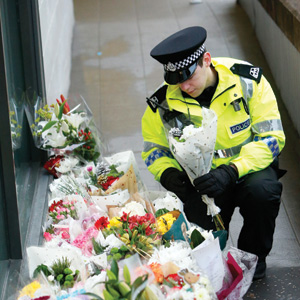Outside a modern hotel that stretches along the north edge of the rectangle of central Glasgow’s George Square, a few shoppers and tourists can still be seen avoiding a short stretch of pavement; some queue at pedestrian lights to take a detour. Even the less observant could not miss the floral tributes. For it was here, three days before Christmas last year, that six pedestrians – three of them from a single family – were killed and 15 others injured by a runaway bin lorry.
It took just 19 seconds for the vehicle to travel from the Gallery of Modern Art to the wall of the Millennium Hotel. Closed-circuit footage in the public domain shows the vehicle jerk sickeningly as it comes to a halt. It does not show the human damage; that was reported by people at the scene almost at once. Anyone who was shopping or working near George Square that day phoned or texted loved ones to say that they were “OK”, even before most families knew there was any reason to be concerned.
Photographs issued later showed the lorry driver Harry Clarke, looking dazed, being helped from the wrecked cab. The medical verdict suggested he had suffered a vasovagal episode or neurocardiogenic syncope, a not uncommon problem that leads to loss of consciousness in circumstances that can range from sitting or standing too long to a bang on the elbow, or even anticipation of unpleasantness. Ranks closed. Public sympathy was engaged, and not just for the obvious casualties. Clarke was seen as a victim, too.
Glasgow has had its share of recent disasters, no more or less than any other major city. There was a terrorist-inspired bombing at the city’s airport in 2007. More recently, there was the police helicopter crash at the Clutha Vaults pub on 29 November 2013, which ultimately claimed 10 lives. The accident happened close by Glasgow’s Catholic cathedral, which became a focus of mourning and support. And it was there, two years later, that Archbishop Philip Tartaglia addressed a very different kind of urban tragedy, one that had unfolded not in Glasgow but across the arrondissements of Paris.
What the archbishop said in his Mass of solidarity with France following the attacks on 13 November chimed with those earlier, more local, incidents. “What happened in Paris was not a random tragic accident of the kind we have seen in Glasgow in the last two years, which have left us all bewildered. The difference is that we know the why of the Paris atrocity. There is no mystery about it. Men did it. They wanted it. They planned it.”
There is the heart of the dilemma that surrounds an incident that took place in the heart of a city that was preparing for the most joyous and most family-centred time of the year. Reflecting on the fatal crash of 22 December 2014 has engaged Glaswegians at many levels.
The bin lorry crash raises more subtle questions about cause and responsibility. For a time, the episode that overtook Clarke seemed like the random bolt that can afflict a middle-aged man, a one-off to which no blame attaches. Then it emerged that far from being an isolated incident, the fainting attack was one of several that Clarke had suffered in his working life.
That seemed to change pure accident into the more disturbing category of accident waiting to happen. Some vasovagal patients [and this writer is one] wait years for a reliable diagnosis, but uncertainty as to exact causes does not remove the obligation to make such episodes known to prospective employers, particularly where machinery or human passengers are involved.
What turned the tide was the revelation that far from being an unsuspecting victim, Clarke had routinely ticked “none” when asked about any ongoing medical issues. From a man accorded an astonishingly generous measure of sympathy by a city that has always embraced its sinners, Clarke turned into a full-scale tabloid hate figure.
The obloquy he now receives is partly shared with an inquiry that concluded there were no legal grounds on which to prosecute him, given that there was no direct connection between his past reticence and the events of 22 December last year – though it now seems likely he will face a civil prosecution on behalf of the victims’ families. He recently apologised for his role in the crash. Glasgow City Council says it will implement recommendations put forward by Sheriff John Beckett following a fatal accident inquiry.
What does it all mean? Glasgow likes nothing better than a tough philosophical crux, but this one – especially when laid alongside other recent examples of urban disaster – has too many sharp edges. The former Episcopal Bishop of Edinburgh, Richard Holloway, now a broadcaster and writer on ethical issues, summed it up in the following way:
“The sad thing about the driver is that his was a sin of omission. Had he come out at the beginning and owned up, there would have been wrath but it would have brought resolution and some kind of peace to the bereaved. His cruelty lies less in committing an evil than in refusing a duty that could have prevented an evil. Most people get that distinction.”
Most Glasgow people certainly do. Friends of the bereaved families suggest that they share the former bishop’s belief that Clarke’s backstory compounds and extends the horror and introduces an uncertainty into urban living: not how many passing faces conceal a possible terrorist, but how many human time bombs of a quite different, but not “innocent”, sort do we brush up against every day? And how can those with responsibility for protecting society detect and separate them?
Philosophy is all very well. Ordinary citizens of Glasgow seem to agree on one thing. As one lady in George Square last week put it: “It just shows you that all the presents and” – gesturing towards the lights – “all the decorations don’t mean much in the end. And nor does punishing one man or even a whole council. What matters is loving people and keeping them close and safe.”
Brian Morton writes for The Tablet from Scotland.
17 December 2015, The Tablet
Fatal sin of omission
Tragedy in Glasgow
Edmund for England
 Loading ...
Loading ...
Get Instant Access
Subscribe to The Tablet for just £7.99
Subscribe today to take advantage of our introductory offers and enjoy 30 days' access for just £7.99





What do you think?
You can post as a subscriber user...
User Comments (0)